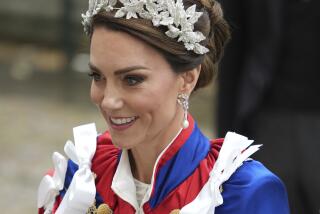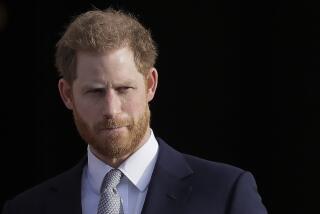Report on British news media abuses calls for new regulator
LONDON — Britain should set up an independent regulator to monitor its freewheeling news media and prevent abuses such as the phone-hacking scandal that exposed unethical and sometimes illegal news-gathering practices, a senior judge said Thursday after a yearlong investigation.
The new regulating body should be established by law and exclude politicians and editors to guarantee its independence from government and industry pressure, Lord Justice Brian Leveson said in a much-anticipated report that blasted the aggressive tactics often associated with British tabloids and paparazzi.
But Prime Minister David Cameron, who commissioned the inquiry, shied away from the proposal, which put him at odds with phone-hacking victims, the political opposition and his own deputy. Cameron told Parliament that stronger oversight was badly needed but warned that enshrining it in law could be a dangerous first step toward state control of the news media.
“We should, I believe, be wary of any legislation that has the potential to infringe free speech and a free press,” Cameron said. “We should think very, very carefully before crossing this line.”
The proposal was the centerpiece of Leveson’s 2,000-page report, a wide-ranging examination of news media practices and ethics that was spawned by the phone-hacking scandal. The judge spent months hearing testimony from leading politicians, newspaper proprietors such as Rupert Murdoch and high-profile figures such as actor Hugh Grant and author J.K. Rowling, who spoke bitterly of being hounded by reporters and photographers.
Leveson said he recognized the need for a vigorous press in a democratic society to hold the powerful to account and to bear witness. But irresponsible parts of the news media had “wreaked havoc in the lives of innocent people” through their intrusions on privacy and relentless pursuit of scoops.
He singled out the Murdoch-owned News of the World for particularly harsh criticism. Evidence has emerged of widespread criminal conduct at the now-defunct tabloid in the form of hacking into the voicemail of celebrities and others.
Revelations that the paper had even accessed the cellphone messages of a kidnapped 13-year-old girl, who was later found killed, caused a massive uproar last year. In response, Murdoch shut down the 168-year-old tabloid, shelved a bid to take over satellite broadcaster BSkyB and was summoned to answer questions before Parliament.
The press “holds a privileged and powerful place in our society,” Leveson said. “But this power and influence carries with it responsibilities to the public interest in whose name it exercises these privileges. Unfortunately, as the evidence has shown beyond doubt, on too many occasions those responsibilities … have simply been ignored.”
His proposal envisages a regulatory authority to replace the industry-funded Press Complaints Commission, widely recognized as having been a failure. The new regulator would have the power to levy fines of as much as $1.6 million and demand prominently placed corrections or retractions by newspapers.
Although politicians would not participate, so as to avoid the possibility or appearance of undue political pressure on the news media, the new body would have the backing of a law passed by Parliament.
Cameron said even that step, which could entail lawmakers determining the regulator’s powers and its composition, might lead to more government interference with the press. His concern echoes the reservations of news organizations, which have suggested a stronger form of self-regulation, and some civil liberties activists.
Kirsty Hughes of the Index on Censorship, a free-speech advocacy group, said a government regulator would set a poor global example. Undemocratic regimes could cite Britain as an excuse for cracking down on the news media in their countries under the guise of better oversight.
“The fact that there’s a very detailed statute through Parliament on what an independent press regulator should look like is too much involvement of politicians,” she said. “We do find it worrying.”
For Cameron, the new report adds to what has been a politically sticky situation.
He has been embarrassed by revelations of his warm relationship with Rebekah Brooks, who headed Murdoch’s British newspapers before she was forced to resign in disgrace because of the scandal. Cameron’s former senior communications aide, Andy Coulson, who once served as editor of News of the World, has also been implicated.
Brooks and Coulson were in court Thursday on charges of bribing public officials for information when they worked at Murdoch-owned publications. They deny the allegations.
By balking, for now anyway, at a regulator rooted in law, Cameron quickly came under fire from hacking victims who said they were disappointed with his response and from the opposition Labor Party.
“It looks like he failed his own test. He appointed the lord justice to make recommendations, and now he says he’s not going to follow them,” said Mark Lewis, the attorney for the family of the kidnapped teenager whose phone was hacked.
More unusual, Deputy Prime Minister Nick Clegg, the head of the Liberal Democrats, stood up in Parliament and publicly disagreed with his boss, highlighting the tension within Britain’s coalition government, which is led by Cameron’s Conservatives.
Clegg joined Labor leader Ed Miliband in calling on the prime minister to accept Leveson’s recommendation. Clegg said he was satisfied that the system proposed by the judge would not infringe on the news media except to rein in their unsavory and sometimes callous excesses.
“A free press does not mean a press that is free to bully innocent people or free to abuse grieving families,” Clegg said.
More to Read
Start your day right
Sign up for Essential California for news, features and recommendations from the L.A. Times and beyond in your inbox six days a week.
You may occasionally receive promotional content from the Los Angeles Times.







